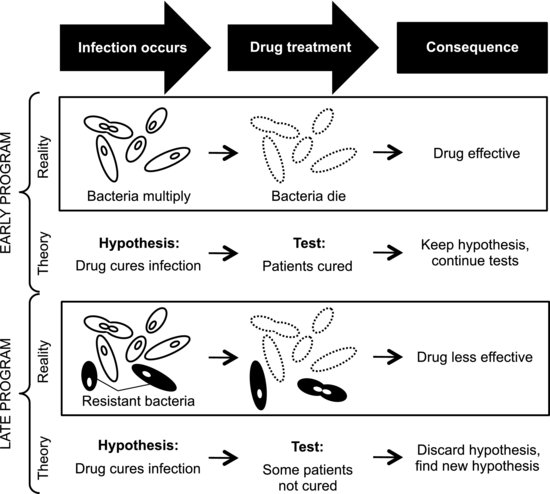2.5 The Role of Confirmation
From now on I am going to switch perspectives. So far I have described science from the point of view of philosophy, which is an outside perspective. Researchers, who apply the scientific method every day, tend to look at it differently. Many scientists think that the hypothetico-deductive method, and falsificationism in particular, gets a negative taint by stating that science progresses by disproving theories. With a little bit of travesty, falsificationists would remain unmoved if their observations were to support their hypotheses. Instead of cheering at the confirmation of their ideas they would begin to think about new ways to kill them. This is counter-intuitive to most working scientists. People are seldom awarded Nobel prizes for having disproved a theory but rather for discovering and explaining new phenomena. In all fairness, confirmation does play a role in the hypothetico-deductive approach [3]. If a bold hypothesis is confirmed it corresponds to the discovery of something unlikely. Similarly, if a cautious hypothesis is falsified it means that something that seems self-evident is, in fact, incorrect. Both of these scenarios represent significant advances in science. Conversely, little is learnt from the falsification of a bold theory (something unlikely is false) or confirmation of a cautious theory (something likely is true). For the hypothetico-deductivist, confirmation is important so long as it is of novel predictions resulting from bold hypotheses [3].
Problems do arise with the hypothetico-deductive method when we realize that observations that are contrary to a theory do not necessarily render it false. This was arguably the case with Newton's mechanics. I think that the following (imaginary) example shows that scientists do not necessarily think like falsificationists. Imagine that we discover that a certain type of mold kills bacteria. We may then hypothesize that it can be used as an antidote to bacterial infection. To test the hypothesis we set up a program of double blind tests on a group and a control group of patients. The results of the study turn out to be encouraging and, after follow-up studies, we start using the drug and successfully treat patients on a large scale. We may now ask ourselves if we have proven our hypothesis. The falsificationist would firmly say no; it is not logically possible to prove an hypothesis by observation. But many scientists would consider the statement of the hypothesis to be true, at least until proven otherwise. Most scientists are more pragmatic than many philosophers of science and tend to consider theories to be “innocent until proven guilty”.
Now, to add some excitement to this research program, suppose that some bacteria develop a resistance to the drug. As a result, some patients do not recover when treated with it. Does this new state of affairs disprove the theory? The falsificationist would probably vote yes, although I think it is evident from the example that it is difficult to make a clear-cut decision. Large-scale treatment of patients with a new drug changes the environment in which the bacteria live. This exerts an evolutionary pressure on the bacteria to adapt to the new situation. If a mutation in a bacterium improves its ability to survive in the new environment, its genes will gradually become more common in the gene pool and a resistant strain will develop. The state of Nature has thus changed after the study was made. Figure 2.3 illustrates these events and how a falsificationist would react to them.
Figure 2.3 An imaginary example of testing an hypothesis. In the first trials the drug kills the bacteria and the patients are cured. The hypothesis is kept and subjected to further tests. At a later time, a resistant strain has developed. The drug is suddenly less effective and the hypothesis should be discarded. But has it been disproved?

As scientists, we may prefer to make an addition to our theory instead of discarding it altogether. We may say that the drug works as an antidote to bacterial infection, except when the bacteria have developed resistance to the drug. Does it sound like an ad hoc modification? Well, if we can think of a way to identify the resistant bacteria without using the drug the modification is independently testable. Otherwise it is not. So, if the addition is to be considered to be ad hoc or not depends on if we have enough knowledge to test it independently of the original theory. If that knowledge is not in place, the falsificationist would want us to discard the theory. In reality, scientists would probably know better than that. After all, the drug used to be completely effective. The fact that it has become less effective will certainly inspire us to look deeper into the problem but not to discard a theory that has been confirmed in rigorous tests. The trustworthiness of theories is not quite so black and white as the falsificationist describes it to be. There is often a gradual transition from the suspicion that there is a problem to the realization that the theory no longer fills its purpose; practically minded people will probably realize when it is time to abandon the theory without consulting the philosophy books.
I ended the section about inductivism by saying that scientists must strive to understand the hidden machinery of Nature to be able to explain, rather than just describe, what they see. Since the hypothetico-deductive method begins by formulating hypotheses, the striving to understand this machinery is built into the method. As opposed to pure inductivism, it has the ability to produce theories with explanatory power. Although the example above illustrates some of the risks of following it too slavishly, the basic principle of the hypothetico-deductive method is highly useful. This is why the remaining parts of this book tend to favor it over the inductive method. Before we discard inductivism completely, however, let us discuss if the criticism against it really holds together from a scientist's perspective.
